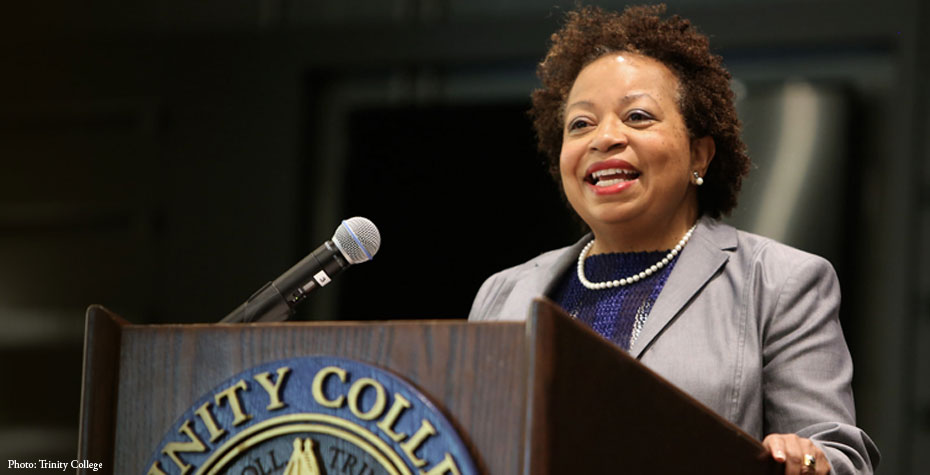Kip Lynch ’22
Executive Editor
The Tripod sat with President of the College Joanne Berger-Sweeney, as well as Director of Media Relations Stacy Sneed and Chief of Staff of the President Jason Rojas, in order to talk about the state of Trinity during the COVID-19 pandemic. Other discussion topics included the College’s commitments to diversity and equity, capital projects, the Comprehensive Campaign along with planning for the College’s Bicentennial, and her continued leadership of the institution.
Berger-Sweeney also revealed during the course of the conversation that she does not plan on seeking a third term as President, citing a possible retirement and that she “thinks that would be a beautiful time to move on and pass what I hope is a torch in a relay about an institution that I love and care about deeply.”
Her current contract, renewed unanimously by the Board of Trustees in Apr. 2018 for a second five-year term, is set to expire in 2024. Berger-Sweeney has served as 22nd President of the College since being inaugurated in 2014.
On whether the College would adjust any of its COVID policies for the spring semester, Berger-Sweeney stated that she was unsure as “we have not fully debriefed on this semester.” Considering it premature to specify changes, she indicated that administrators will be looking at data collected over the past semester including where clusters appeared while conducting surveys of all constituent groups to get a sense of overall opinions in regard to the previous semester’s policies. Sneed added that the College “will be looking at testing protocols, too” as part of that evaluation of the semester’s policies.
Trinity did test a significant number of students this semester in partnership with the Broad Institute: 51,446 tests since Aug. 17 according to the College’s COVID-19 dashboard.
Despite Trinity College having the highest number of COVID cases in the NESCAC and doing considerably worse than some of its peer schools in the State of Connecticut, Berger-Sweeney indicated that she considered the past semester a success because the College was able to complete the semester without going fully online and sending students home. She stressed that the College’s positivity rates during the semester were lower than the state as a whole, in part due to the efforts of community members and widespread compliance with testing protocols. Berger-Sweeney also spoke extensively of the College’s work and response to the pandemic in a recent op-ed in The Hartford Courant published last week.
Sneed, attributing some of the case total difference to location, commented that “You have to consider we are in a capital city, that’s a major difference if [sic] comparing to colleges in rural communities.” Trinity lagged slightly behind Yale, in the similarly-sized urban center of New Haven, by about 70 positive cases. Yale elected to bring back 3,500 of its 6,000 undergraduates and most of its extensive graduate network numbering nearly 7,500, while Trinity brought back almost its total student population of 2,000.
Deeply grateful for the work of ABM, Chartwells, and Campus Safety employees among others, Berger-Sweeney also considered the semester a success because students “for the most part, abided by the guidelines that we set out.” Berger-Sweeney also spoke of her educational background and how it entailed a unique approach to dealing with the pandemic, noting that “public health is something I care about. The science is something I understand and I do think I was able to bring that understanding and approach to what we did…I do think this being my intellectual and educational and academic background helped in me understanding and reading through the materials.
Berger-Sweeney has a Masters of Public Health from the University of California, Berkeley, and a Doctor of Philosophy in Neurotoxicology from the Bloomberg School of Public Health at Johns Hopkins University.
On the specific issue of the administration’s decision to annex the Stowe and Clemens dormitories for quarantined students without informing the non-infected students or their parents beforehand, Berger-Sweeney stated, “I actually don’t have anything to say about that because that wasn’t at a level at which I was participating in any discussions with Hartford HealthCare.” Chief of Staff to the President Jason Rojas characterized this as an isolated incident and stated that they didn’t want to disclose the reasoning behind the decision because it concerned an individual student being housed in Vernon Place. However, Vernon Place was not the only dormitory used for housing quarantined students and there are multiple documented incidents of the College quarantining students on the same floor as non-infected students beyond the single case that Rojas referred to. He further stated that “I don’t even know that Hartford HealthCare necessarily had all the information.” Rojas had previously informed the Tripod that Trinity College works “continuously with Hartford HealthCare to assess and inform our practices,” though the extent of this cooperation was not immediately available.
With regard to diversity and equity, which was a flashpoint of racial tension this summer over a series of incidents on social media, Berger-Sweeney stressed that “I think diversity, equity, and inclusion should be woven through everything that we do.” In regard to if there is a specific committee dedicated to diversity, Berger-Sweeney stated “I hope the answer is no because I hope that, whether it’s a finance committee, whether it is an admissions committee, that these principles and values are undergirding everything that we do. So, in that sense, I hope the answer is no. But what we did decide to do as a Board of Trustees was create a Diversity, Equity, and Inclusion Committee at the board level with that committee being charged with particularly talking about and developing metrics to which, as an entire community, we would hold ourselves accountable.”
On whether the College would explore responding to student concerns, Berger-Sweeney stated that she and Vice President for Diversity, Equity, and Inclusion Anita Davis had charged different constituent groups, including students, faculty, staff, and alumni, on the Campus Climate Task Force with creating plans to advance diversity. Berger-Sweeney noted other avenues for students with concerns to engage in a dialogue with the administration, including the various surveys sent out to the student body as well as her open office hours, which are held at least every three weeks. She noted that most students tend to make positive statements while around 25% tend to raise concerns.
With regard to how the pandemic has changed strategic planning for the Comprehensive Campaign, Berger-Sweeney described how the College shifted priorities toward “current use” dollars and financial aid. She further described how Advancement had shifted focus away from capital projects and raised an additional $1.5 million for the financial aid budget, stating that “We do have the capacity and flexibility to focus our needs where we want when we have very immediate needs, at the same time keeping our eyes on that long ball of trying to complete a Comprehensive Campaign.” The Campaign, which began to gain attention in Nov. 2019, has set an objective of $435 million, an objective that Chair of the Board of Trustees Cornelia Thornburgh remains “optimistic” about achieving. To date, the College has raised $182 million in support of that goal as of late September.
As for the current state of the College’s capital projects and maintaining historical structures, Berger-Sweeney noted how the plan for renovating the Chapel was developed 2-3 years ago, stating “we assess what the problem is, we have priorities, and then we try and just, year-by-year, chip away at what is an ongoing issue, and the Chapel is one that I feel really strongly about…because I would really like to see us make some much needed repairs to that beautiful and signature building on our campus.” Under the original Comprehensive Campaign objectives, the College sought to raise $20 million to support repairs to the Chapel infrastructure.
On the prospect of increased alumni involvement once the Comprehensive Campaign exits the “quiet phase,” Berger-Sweeney emphasized that alumni could become involved at any point regardless of campaign stage but noted that “most of the money comes from a very small number of people. That’s just the way higher education fundraising works these days. And so, if you really want to achieve your goals, focusing on probably a smaller number of individuals who can make significant progress towards the campaign is a wise thing to do and then you open it up to a wider broader community a little bit later in the process.”
Berger-Sweeney also revealed that the pandemic had not significantly disrupted the College’s plans for the Bicentennial in 2023. She described how, “during the pandemic, I decided it was really important to get the bicentennial project moving and…I thought that the most important thing was to get chairs of the bicentennial committee.” She revealed that the chairs are current trustee Kelli Tomlinson ’94 and former trustee Philip Khoury ’71, who is the Ford International Professor of History and Associate Provost at the Massachusetts Institute of Technology. Berger-Sweeney further revealed that “they will be making an announcement sometime after the New Year about the formation of a broader bicentennial planning committee” with the intention of holding the celebration starting in the fall of 2022. It will run for 18 months through December of 2023.








+ There are no comments
Add yours